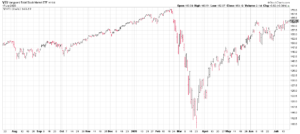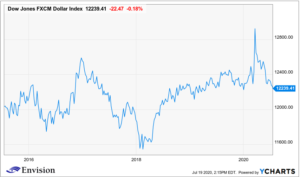MARKET RECAP
US stocks advanced by 1.39% in the US and 1.02% outside the US. Bonds were up by 0.33%. Stocks are at a key technical level, pushing up against the recent June 8th high.
As we have written about before, the market is flush with liquidity and that is propping up stocks. Super-low interest rates are also a driving factor. The real rate of interest, which can roughly be measured by the difference between the break-even inflation rate and the 10-year treasury yield, is now negative at about -0.8%. That essentially means that investors are losing money on bonds, pushing them into riskier assets. It also helps explains the weak US dollar (see below) which has fallen since March and the rally in gold and stocks.
Banks are bracing for big loan losses. JP Morgan, Citigroup, and Wells Fargo have reserved $28 billion to prepare for losses down the line. JP Morgan expects the unemployment rate to remain in double digits through next year. Jamie Dimon, the JPM CEO, said that “the recessionary part of this you’re going to see down the road.” Banks expect more problems with paying back loans as government assistance ends. Bank executives did say they saw signs of a recovery as states began to reopen. But the expanding coronavirus is now leading to a pullback in openings. California instituted an immediate halt to indoor activities in restaurants, bars, museums, and movie theatres and also announced that the two largest school districts would start the year on-line. In Hong Kong, Disneyland closed less than one-month after reopening.
In a grim sign for the airline industry, Delta reported a $5.7 billion dollar loss in the second quarter, due mainly to the almost complete absence of passengers in April. But Delta said capacity this quarter would only be 25% of the level of one year ago. Analysts are forecasting combined losses of $23 billion for the industry this year.
The US budget deficit hit $3 trillion for the 12-months ended June 30 due to high stimulus spending and lower tax revenues. As a share of GDP, the 12-month deficit measures 14%. The CBO is projecting a $3.7 trillion deficit for the fiscal year ending September 30th. But that is before what might be another stimulus package now under discussion.
There was a bit of good news out of China. The country reported 3.2% growth for the second quarter. China has benefited from an aggressive campaign to keep the virus under control
Chipolte said it will add 10,000 employees as it opens drive-through lanes for digital orders and Starbucks said it would open about 50 pickup-only stores over the next 18-months. Both examples of how the virus is changing consumer behavior and the restaurant business.
SCOREBOARD



